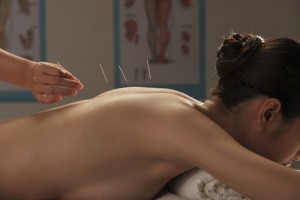 Electroacupuncture (EA) may be able to reduce symptoms of fatigue, anxiety and depression from early stage breast cancer patients, who experience joint pain due to the use of aromatase inhibitors (AIs) for the treatment of the disease, according to a research from the Perelman School of Medicine at the University of Pennsylvania.
Electroacupuncture (EA) may be able to reduce symptoms of fatigue, anxiety and depression from early stage breast cancer patients, who experience joint pain due to the use of aromatase inhibitors (AIs) for the treatment of the disease, according to a research from the Perelman School of Medicine at the University of Pennsylvania.
This is the first the time a study defines the benefits of EA, small electric stimulus through pairs of acupuncture needles, in the improvement of these symptoms.
The results, published in the Cancer journal, revealed the efficiency in reducing fatigue, anxiety and depression in eight weeks, during a randomized, placebo-controlled trial meant to confirm prior data released in November from last year. AIs are the most common type of drugs prescribed to post-menopausal women with early-stage, hormone receptor positive breast cancer, to prevent the recurrence of the disease. However, it often causes patients fatigue, anxiety, depression and sleep disturbances. Moreover, almost half of the patients don’t complete their treatment and stop taking the medication or don’t take them as recommended.
“Since many patients experience pain, fatigue, anxiety and depression simultaneously, our results provide an opportunity to offer patients one treatment that may target multiple symptoms,” lead author Jun Mao, MD MSCE, associate professor of Family Medicine and Community Health at Penn’s Perelman School of Medicine explained in a University’s press release. “We see patients every day who are looking for ways to combat some of the side effects of their treatment. What is particularly significant about these new results is that we can now offer more evidence-based treatment and management solutions for these women.”
[adrotate group=”3″]
The researchers conducted a trial for eight weeks in order to assess the short-term effects and safety of EA, compared to sham acupuncture, which is non-electric, placebo acupuncture in which the needles are not inserted into the skin. The conclusions were based on patient-reported experiences of fatigue and psychological distress, measured before the beginning of the study, and periodically throughout it, as well as four weeks after the treatment.
Patients who receive EA reported a reduction of the fatigue experienced by 2.0 points on average, at both week eight and 12, according to the Brief Fatigue Inventory, in a standard scale from 0 to 10 to measure fatigue. Regarding anxiety, patients in the EA group reported a 2.2 point reduction on the Hospital Anxiety and Depression Scale (HADS), in comparison to the usual care group. The same patients reported an improvement of 2.4 points in HADS-Depression scores, and the effects of EA on depression were maintained until the 12th week.
“Our study provides a novel understanding of how fatigue, sleep and psychological distress relate to pain in patients with AI-related joint pain. More importantly, we found that acupuncture helped reduce these symptoms and the effects persisted for at least four weeks following treatment,” stated Dr. Mao. “There is a small but growing body of literature showing that acupuncture is effective for the management of pain, fatigue, anxiety and depression. However, studies with larger sample sizes and longer follow-up periods are needed to provide more in-depth knowledge about how these treatments, combined with usual care, are improving quality of life for our patients.”

